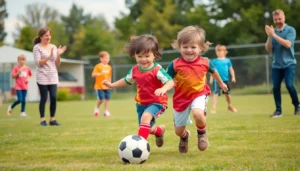Table of Contents
ToggleFinding the right sport for kids can feel like searching for a needle in a haystack—except the needle is a perfect match for your child’s energy and interests. With so many options out there, it’s easy to get overwhelmed. But fear not! The world of sports is brimming with exciting choices that can turn your little couch potato into a superstar athlete—or at least keep them from bouncing off the walls at home.
Importance Of Sports For Kids
Engaging in sports provides essential benefits for children. Active participation helps develop various skills and promotes overall well-being.
Physical Benefits
Physical health improves significantly with regular participation in sports. Sports help children maintain a healthy weight, reducing obesity risks. Increased cardiovascular fitness strengthens the heart and lungs. Developing coordination enhances motor skills, benefiting daily activities. Sports also boost bone strength, crucial for growing bodies. Consistent physical activity stimulates growth and fosters lifelong fitness habits.
Social Benefits
Social skills flourish through sports involvement. Teamwork builds collaboration skills, teaching children how to work towards a common goal. Interacting with peers enhances communication abilities while fostering friendships. Sports also instill discipline and sportsmanship, emphasizing respect for others. Exposure to both victory and defeat promotes resilience, helping kids navigate challenges. Overall, sports create a supportive environment for making lasting connections.
Top Sports For Kids
Choosing the right sport can enhance a child’s development. Engaging in sports nurtures physical skills and social abilities.
Team Sports
Team sports foster collaboration, communication, and unity among players. Soccer encourages kids to develop agility, endurance, and strategic thinking. Basketball builds hand-eye coordination and fosters fast-paced teamwork. In baseball, children learn patience and precision while enjoying friendly competition. Volleyball enhances coordination and promotes teamwork through dynamic play.
These sports create lasting friendships and offer a supportive community. Participation in team sports builds confidence and instills essential life skills.
Individual Sports
Individual sports provide children with opportunities to develop skills at their own pace while fostering a sense of personal achievement. These activities can cater to various interests and fitness levels, making them accessible for many kids.
Swimming
Swimming stands out as a vital life skill and an engaging sport for children. It promotes overall fitness through cardiovascular health and muscle strength. Regular practice can enhance stamina, flexibility, and coordination. Children often enjoy swimming due to its refreshing nature and versatility, whether in a pool or natural water setting. Additionally, swimming classes encourage discipline and can build self-confidence as kids master various strokes. The focus on personal progress helps children understand their strengths, making swimming a rewarding experience.
Tennis
Tennis offers children a fun way to improve hand-eye coordination and agility. Players learn strategic thinking through each match, as they anticipate their opponent’s moves and develop effective tactics. Court positioning and shot selection are crucial elements that keep kids engaged. Social interactions during matches foster communication skills and sportsmanship. Individual and doubles formats allow for varied playing experiences, catering to different preferences. Regular practice not only enhances physical fitness but also builds resilience in facing competition. Overall, tennis serves as an excellent choice for cultivating various essential skills and fostering a love for active living.
Factors To Consider When Choosing A Sport
Selecting a sport for kids involves various factors that influence their experience and development.
Age Appropriateness
Age suitability plays a vital role in choosing a sport. Different sports have specific requirements that align with a child’s physical and cognitive abilities. For instance, younger children often thrive in games that emphasize fun and basic skills. Sports like soccer and T-ball introduce simple rules and teamwork. As children grow, they can handle more complex sports like basketball or gymnastics that require improved coordination and strategy. Ensuring that the sport matches a child’s developmental stage enhances safety and fosters a positive experience. Tailoring choices to these age-related factors significantly improves engagement and satisfaction for kids.
Interest and Enjoyment
Interest levels greatly impact a child’s willingness to participate in sports. Parents should consider their child’s preferences, as enjoyment leads to sustained involvement. Engaging in sports aligns with individual interests, whether it’s a team-oriented activity like football or a solo sport like swimming. Observing children while they explore various sports can help identify what excites them the most. Enjoyment fosters motivation, encouraging kids to practice and improve their skills. By prioritizing fun and personal interests, parents can support their children in developing a lifelong appreciation for physical activity.
Encouraging Kids To Stay Active
Staying active plays a crucial role in a child’s overall development. Encouragement creates a supportive environment that inspires kids to embrace fitness.
Setting Goals
Establishing achievable goals promotes a sense of purpose in children. Small milestones can lead to greater achievements, showcasing progress over time. Setting specific activity targets allows kids to gauge their performance. Achieving these goals fosters confidence and provides motivation. Parents can assist by celebrating successes, maintaining enthusiasm, and reinforcing a positive attitude toward physical fitness. They should balance challenge with attainability, ensuring kids find satisfaction in their efforts.
Making It Fun
Making sports enjoyable increases the likelihood of sustained participation. Engaging activities keep children eager to join practices or games. Incorporating games, challenges, and variations introduces excitement and variety, fostering a love for movement. Kids tend to be more enthusiastic when they participate in sports with friends. Social connections create a supportive atmosphere, making physical activity a cherished experience rather than an obligation. Facilitating family involvement in sports fosters community and encourages kids to stay active long-term.
Finding the right sport for kids can be a rewarding journey that promotes their physical and social development. By exploring various options and considering a child’s interests and age, parents can select activities that not only enhance fitness but also cultivate essential life skills. Whether through team sports that foster collaboration or individual pursuits that encourage personal growth, the goal is to make physical activity enjoyable and engaging.
Encouraging children to embrace sports creates a foundation for a healthy lifestyle. With the right support and environment, kids can develop a lifelong love for movement and fitness, leading to lasting friendships and a sense of community. Prioritizing fun and achievement in sports will inspire children to stay active and thrive both on and off the field.






